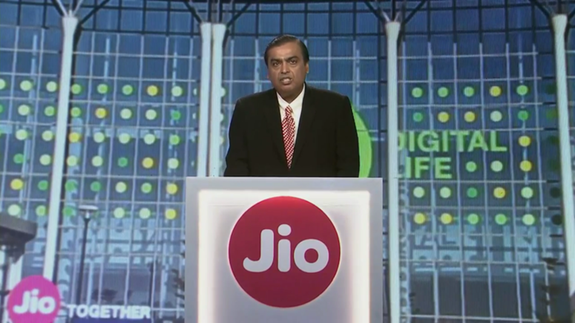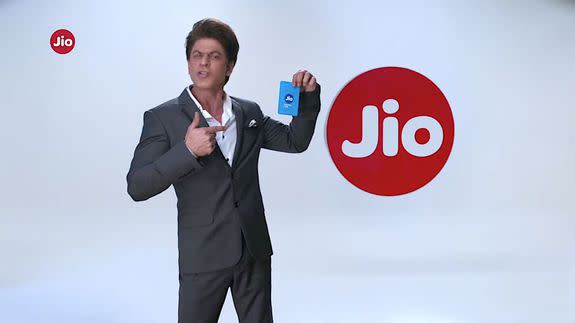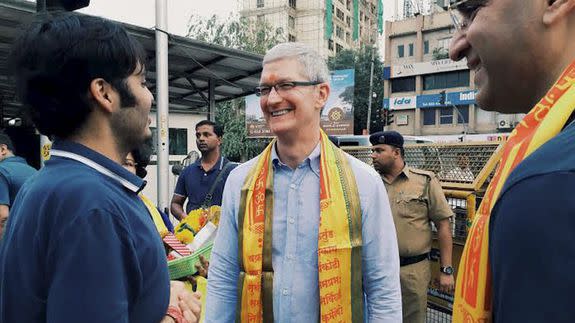Inside Reliance Jio's audacious plan to disrupt India's internet landscape

"Today, India is ranked 155th in the world for mobile broadband Internet access, out of 230 countries. Jio is conceived to change this. I have no doubt that with the launch of Jio, India’s rank will go up to among the top ten. 1.2 billion Indians cannot be left behind as the world enters a new era." With these words, India's richest man Mukesh Ambani commercially launched Jio, the world's first 4G LTE only network.
Fast forward three months later, Jio already claims to have more than 50 million subscribers, adding nearly half-a-million subscribers every day or over 400 subscribers every minute.
SEE ALSO: Reliance Jio launches 4G network in India, offers unlimited free voice calls
To put things into perspective, India's oldest private carrier, Airtel, has 255 million subscribers. Vodafone, which is the second largest carrier, has 200 million subscribers. In fact, at its current growth rate, Jio is barely a month away from pipping state-run BSNL to become the fourth largest carrier.
Setting the cat among the pigeons
During his speech on Sep. 1 to launch Jio, Ambani shook the industry by announcing Jio won't charge subscribers for making voice calls, ever. All calls made to any number in the country, even when the subscriber is roaming within the country, will be free. This move directly impacted every existing carrier's main revenue source. Voice services still account for 70 percent of Airtel's revenues.
To spice up things even more, Ambani announced that as a part of its "Welcome Offer" all Jio services will be free for every subscriber. Anyone, who had valid identification documentation, could essentially get three months of unlimited voice calls, 4GB of 4G LTE data every day, live TV streaming, music streaming and much more without spending a buck.
As expected, serpentine queues formed outside Reliance stores with people trying to get their hands on the elusive Jio SIM card. It took weeks for the situation to normalize but adding over half-a-million new subscribers daily was never going to be easy.
The empire strikes back

Reliance Jio had first acquired 4G LTE spectrum way back in 2010, becoming the first player to have spectrum in 2300MHz band across India. Since then the industry had been waiting for Reliance Jio, with multiple false alarms about its launch since 2014. But when Reliance did launch Jio, no one expected its services to be free.
Reliance Jio's rivals were not prepared for the onslaught that was to follow Ambani's announcement. With the swift uptake of subscribers and unlimited free voice calls, rival networks started getting bombarded by a disproportionate incoming calls and most calls from Jio's network started failing. A blame game continues even today with Jio blaming rival carriers for not playing fair while incumbent carriers continue to blame Jio's networks.
The sudden increase in subscribers on Jio's network also impacted the user experience for data services, the main USP of Jio's network. Users started complaining about slow internet speeds, a fact corroborated by Ookla's Speedtest as well.
As things stand right now, many Jio users are unable to call people on other networks and most continue to grapple with slow internet speeds. But a big chunk of Jio's 50 million subscribers are hanging on to their SIM cards only because they are not paying a penny, yet.
Jio's "Welcome Offer" ends on Dec. 31, after which subscribers will be expected to pay for the services. The real test for Jio begins then, unless it extends the free service for some more time, which is being speculated in media reports.
Jio, meanwhile, remains unfazed. The company continues to insist that the service issues are not going to be around for long. It reckons users are consuming much more data than normal because of it being free and it is a good test for Jio's network before it commences commercial operations when users start paying. Reports claim Jio is already the world's largest data carrier.
But cellular telephony is just the tip of the proverbial iceberg in Ambani's playbook.
The world is not enough

Image: Reliance jio
I've got a chance to test out some of Jio's vision of the future. One sunny October morning I found myself at Reliance Corporate Park, a sprawling office campus 15 miles from Mumbai airport and the headquarters of Reliance Jio to check out the products the company is currently working on. I arrived a little early and was offered a coffee at one of the handful of food stalls that deck up the campus.
The coffee was paid by Jio Money, the company's digital wallet. Every Reliance Jio subscriber can automatically sign up for Jio Wallet and have a monthly limit of Rs 100,000 ($1,460) without having to furnish the mandatory KYC (Know Your Customer) documents since Jio already has them when you signed up for the connection. With 50 million and growing subscribers, Jio Money could be a big deal especially at a time when Indians are coming to terms with cash crunch due to demonetization of most of their currency.
At the far end of the campus was the experience centre where Jio executives show off upcoming services. The most impressive of them was the Gigabit FTTH internet service that Jio has already started piloting in some cities. The company has promised unheard of tariffs for its FTTH service, which isn't surprising after what it did with its cellular services. Jio has already deployed a fibre optic network across India.
Jio will combine the internet service with an Nvidia Shield Android TV box and run its content services, including Jio TV (live TV streaming) and Jio Cinema (movies on demand). But what really differentiates Jio's TV services from others is the remote control that also has a microphone and can be used to give voice search commands. Users will not only be able to search for channels (there are over 300 of them) but also search for shows and even actors. The search results will show results from all content broadcast over any of the channels over the last seven days. The feature works brilliantly thanks to Google's voice search that understands Indian accents. No other TV streaming service, including Apple TV, has this feature live in India at the moment.
The company is also working on a device to make cars smarter and internet connected. The tiny matchbox sized device fits into the car's "On-Board Diagnostics" (OBD) port and comes with its own companion app. The device creates a Wi-Fi hotspot inside the car and also lets the owner control the car remotely, which can come handy especially if it is being driven by a chauffeur. With the app, one can locate the car, remotely lock it and even control the air conditioning (perfect for the Indian summer to ensure you always enter a cool car).
Then there are other areas of interest including home security, home entertainment and other elements of smart home. Jio is also partnering with metro train services in Indian cities for NFC-based mobile payment solutions paired with Jio Money. For users who don't have NFC-enabled smartphones, Jio is exploring the use of NFC tags and stickers.

Image: Press Trust of India via AP
India's Apple?
During his India visit earlier this year, Apple CEO Tim Cook spent some time with Reliance Jio's management team. Since then Cook has called out Jio in Apple's quarterly earnings calls as one of the reasons why he is bullish about India.
Reliance Industries, which is India's largest industrial house, has already invested upwards of $20 billion in Jio but it is just getting started. Most people often look at Jio as yet another carrier, the likes of Airtel, Vodafone and others. But Ambani's vision to ensure his "polyester to petroleum" empire does not miss out on the digital revolution means Jio will be much bigger than just a telecom and internet service provider. The beginning has been anything but easy and brisk but Jio seems prepared for the long haul.

 Yahoo News
Yahoo News 